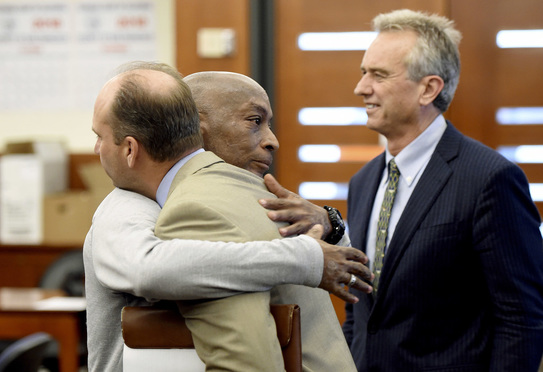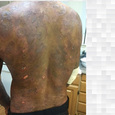Plaintiffs Lawyers Eye More Roundup Lawsuits After $289M Verdict Against Monsanto
“I had 200 calls this morning from people wanting to sign up,” said plaintiff counsel R. Brent Wisner, of Los Angeles-based Baum Hedlund Aristei Goldman.
August 13, 2018 at 06:04 PM
5 minute read
 Dewayne Johnson, center, hugs one of his attorneys, as Robert F Kennedy Jr., right, a member of his legal team, looks on after the verdict was read in Johnson's case against Monsanto at the Superior Court of California in San Francisco on Friday, Aug. 10, 2018. Photo: Josh Edelson/AP
Dewayne Johnson, center, hugs one of his attorneys, as Robert F Kennedy Jr., right, a member of his legal team, looks on after the verdict was read in Johnson's case against Monsanto at the Superior Court of California in San Francisco on Friday, Aug. 10, 2018. Photo: Josh Edelson/AP
Lawyers are gearing up to flood the courts with thousands more lawsuits after a jury last week awarded more than $289 million to a former groundskeeper who said he got cancer from Monsanto's weed killer.
So far, more than 4,000 people have sued over Roundup, most in Missouri and California state courts. About 470 cases have been coordinated in California federal court as multidistrict litigation. Friday's verdict came in a case that was a bit of an outlier: The plaintiff, Dewayne “Lee” Johnson, went to trial first in San Francisco Superior Court because of his poor health prognosis.
 Monsanto Hit With $289M Verdict Over Roundup Weed Killer
Monsanto Hit With $289M Verdict Over Roundup Weed Killer
But the jury's verdict, which included $250 million in punitive damages, was heard loud and clear by plaintiffs lawyers who had cases waiting in the wings.
“This couldn't send a clear enough signal to Monsanto that they are in trouble in these cases, and we have evidence to prove that case wherever it's tried,” said R. Brent Wisner of Los Angeles-based Baum Hedlund Aristei Goldman, who represented Johnson.
He estimated that about 10,000 people had retained attorneys — and more are expected.
“I had 200 calls this morning from people wanting to sign up,” he said.
Micah Dortch of the Potts Law Firm in Dallas said he has more than 120 clients who planned to file their Roundup cases within the next 30 days.
He said he had been waiting on the Johnson verdict “to find out if juries like the science.”
Brian Kabateck, of Kabateck Brown Keller in Los Angeles, hasn't filed any Roundup cases because he initially wasn't convinced there was enough scientific evidence about the product's link to cancer. But the jury's “breathtakingly large amount of punitive damages” on Friday could change his mind.
“I found this very intriguing. When these cases were initially filed, I did not necessarily believe that this was a potentially viable case, and stayed on the sidelines,” he said. “We, like many people, are re-evaluating our decision on this today.”
Plaintiff's Lawyer Asks Jurors for $412M Verdict Against Monsanto
Monsanto has vowed to appeal the verdict. It also has filed a motion for mistrial, citing a “series of calculated, intentional and improper statements during closing argument, several over the court's sustained objections, designed solely to inflame the prejudice and passion of the jury against Monsanto.”
In an interview, Monsanto Vice President Scott Partridge said: “Plaintiffs lawyers conducted themselves in a fashion where they were repeatedly admonished by the judge for their conduct. The judge was so disturbed at one of the motions, she took it under advisement and, the following morning, admonished counsel and instructed the jury to disregard the conduct.”
In particular, they compared Monsanto to Big Tobacco, invited jurors to “change the world” with their verdict and, in closing argument, told the jury there was champagne waiting on ice at a Monsanto boardroom.
“There is no evidence that there were champagne bottles on ice in a Monsanto boardroom,” Partridge said. “That is the type of conduct that is improper and designed solely to inflame the jury.”
The company also plans to argue that the plaintiff didn't make his case, given that more than 800 studies and reviews, and the U.S. Environmental Protection Agency and regulatory agencies around the world, have found Roundup's key ingredient, glyphosate, does not cause cancer.
Johnson's lawyers didn't get everything they wanted: Wisner had asked jurors for $100 million more in punitive damages. It's unclear how the jury calculated its punitive damages.
“At the end of the day, though, it's still a pretty considerable verdict,” Wisner said. “I chalk that up to a jury that was very deliberate in what they were doing. The jury, unlike pretty much any other jury I've seen in my life, was super engaged.”
The next Roundup trial is on Oct. 22 in St. Louis. Plaintiffs lawyers Rudie Soileau of Lundy, Lundy, Soileau & South, and Robin Greenwald of New York's Weitz & Luxenberg will be handling that trial. Soileau said the case involves an Arkansas resident in his 40s, diagnosed with non-Hodgkin's lymphoma after using Roundup at his own home and other neighbors' yards.
At a press conference following the verdict, Wisner told the media that the trial in St. Louis, where Monsanto has its headquarters, could feature corporate executives in person and a “lot more evidence.”
More important, he said, is “we now have a way forward.”
Wisner said, “Monsanto now has an option to do right by all the people that have been hurt, and do right by Mr. Johnson, and do right by everybody else who could be affected by this product.”
Xiumei Dong contributed to this report.
This content has been archived. It is available through our partners, LexisNexis® and Bloomberg Law.
To view this content, please continue to their sites.
Not a Lexis Subscriber?
Subscribe Now
Not a Bloomberg Law Subscriber?
Subscribe Now
NOT FOR REPRINT
© 2025 ALM Global, LLC, All Rights Reserved. Request academic re-use from www.copyright.com. All other uses, submit a request to [email protected]. For more information visit Asset & Logo Licensing.
You Might Like
View All
Law Firms Expand Scope of Immigration Expertise Amid Blitz of Trump Orders
6 minute read

Meta’s New Content Guidelines May Result in Increased Defamation Lawsuits Among Users
Trending Stories
- 1Uber Files RICO Suit Against Plaintiff-Side Firms Alleging Fraudulent Injury Claims
- 2The Law Firm Disrupted: Scrutinizing the Elephant More Than the Mouse
- 3Inherent Diminished Value Damages Unavailable to 3rd-Party Claimants, Court Says
- 4Pa. Defense Firm Sued by Client Over Ex-Eagles Player's $43.5M Med Mal Win
- 5Losses Mount at Morris Manning, but Departing Ex-Chair Stays Bullish About His Old Firm's Future
Who Got The Work
J. Brugh Lower of Gibbons has entered an appearance for industrial equipment supplier Devco Corporation in a pending trademark infringement lawsuit. The suit, accusing the defendant of selling knock-off Graco products, was filed Dec. 18 in New Jersey District Court by Rivkin Radler on behalf of Graco Inc. and Graco Minnesota. The case, assigned to U.S. District Judge Zahid N. Quraishi, is 3:24-cv-11294, Graco Inc. et al v. Devco Corporation.
Who Got The Work
Rebecca Maller-Stein and Kent A. Yalowitz of Arnold & Porter Kaye Scholer have entered their appearances for Hanaco Venture Capital and its executives, Lior Prosor and David Frankel, in a pending securities lawsuit. The action, filed on Dec. 24 in New York Southern District Court by Zell, Aron & Co. on behalf of Goldeneye Advisors, accuses the defendants of negligently and fraudulently managing the plaintiff's $1 million investment. The case, assigned to U.S. District Judge Vernon S. Broderick, is 1:24-cv-09918, Goldeneye Advisors, LLC v. Hanaco Venture Capital, Ltd. et al.
Who Got The Work
Attorneys from A&O Shearman has stepped in as defense counsel for Toronto-Dominion Bank and other defendants in a pending securities class action. The suit, filed Dec. 11 in New York Southern District Court by Bleichmar Fonti & Auld, accuses the defendants of concealing the bank's 'pervasive' deficiencies in regards to its compliance with the Bank Secrecy Act and the quality of its anti-money laundering controls. The case, assigned to U.S. District Judge Arun Subramanian, is 1:24-cv-09445, Gonzalez v. The Toronto-Dominion Bank et al.
Who Got The Work
Crown Castle International, a Pennsylvania company providing shared communications infrastructure, has turned to Luke D. Wolf of Gordon Rees Scully Mansukhani to fend off a pending breach-of-contract lawsuit. The court action, filed Nov. 25 in Michigan Eastern District Court by Hooper Hathaway PC on behalf of The Town Residences LLC, accuses Crown Castle of failing to transfer approximately $30,000 in utility payments from T-Mobile in breach of a roof-top lease and assignment agreement. The case, assigned to U.S. District Judge Susan K. Declercq, is 2:24-cv-13131, The Town Residences LLC v. T-Mobile US, Inc. et al.
Who Got The Work
Wilfred P. Coronato and Daniel M. Schwartz of McCarter & English have stepped in as defense counsel to Electrolux Home Products Inc. in a pending product liability lawsuit. The court action, filed Nov. 26 in New York Eastern District Court by Poulos Lopiccolo PC and Nagel Rice LLP on behalf of David Stern, alleges that the defendant's refrigerators’ drawers and shelving repeatedly break and fall apart within months after purchase. The case, assigned to U.S. District Judge Joan M. Azrack, is 2:24-cv-08204, Stern v. Electrolux Home Products, Inc.
Featured Firms
Law Offices of Gary Martin Hays & Associates, P.C.
(470) 294-1674
Law Offices of Mark E. Salomone
(857) 444-6468
Smith & Hassler
(713) 739-1250







